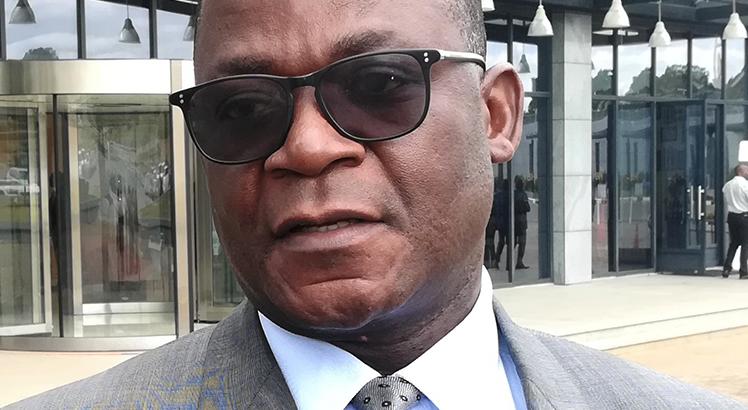Devaluation woes
The Malawi Confederation of Chambers of Commerce and Industry (MCCCI) has said while consumers of imported products are lamenting the high prices of goods, exporters are happy with devaluation.
MCCCI chief executive officer Chancellor Kaferapanjira was yesterday reacting to concerns that the recent 25 percent devaluation of the kwacha has hit traders hard.
He agreed that in the short-term, devaluation has had a negative impact on import, dependent companies, leading to job losses.
Said Kaferapanjira: “But for export companies they began getting the real value for their exports. The amount of kwacha they are receiving for their exports now encourages them to produce more goods and become competitive.
“So while those who depend on imports are lamenting, the exporters are happy.”

Kaferapanjira, who is also President Lazarus Chakwera’s chief economic adviser, said the objective of devaluation was to tame demand for imported goods.
“As such businesses which thrive on trading in imported goods saw prices of their main source of business skyrocket. With the new prices they would not import the same amount of goods at the new exchange rate of the kwacha.
“At the same time effective demand also declined as consumers wouldn’t immediately from nowhere be able to buy the same amount of goods they used to this time at higher prices unless they had savings or they stopped spending on other goods or services.”
But foreign exchange dealers said pressure emanating from demand and supply imbalance of foreign exchange has persisted despite the devaluation.
Financial Markets Dealers Association of Malawi vice-president Jim Kalua, who is also MyBucks Banking Corporation head of treasury, said devaluation has brought minimal relief because Malawi was sitting on a huge foreign exchange backlog.
He said: “Partly it has assisted; however, we really need an [extra foreign exchange] injection. The backlog has slowly reduced.
“But I do not think it will happen overnight, although gradually this imbalance will be perfected,” he said.
Malawi University of Business and Applied Sciences lecturer Betchani Tchereni said for the devaluation to have the desired impact, the kwacha was supposed to be devalued at least by 40 percent.
He said: “The actual devaluation to really control the demand for the foreign exchange should have been more than 25 percent. One would have expected, somewhere around 40 percent.
“So, to tell the truth, forex is not available and that shows that the intended purpose is not being fulfilled.”
Economist analyst Bond Mtembekeza said it was clear that devaluation would not help Malawi because the country is a net importer and has a narrow export base.
He said: “From history, we know that devaluation does not really help Malawi, largely because we are a net importer.
“That is to say that regardless of the exchange rate, we still import. At the same time, our export base is very narrow and is constantly undermined by side bottlenecks like energy and quality”
Data from Nico Asset Managers corroborate that official and private reserves continue to decrease. As at close of June 2022, total forex reserves stood at $817.33 million or 3.27 months of import cover from $854.69 million or 3.42 months in December 2021.
On May 26 this year, the Reserve Bank of Malawi devalued the local unit amidst a crippling shortage of foreign exchange.
RBM Governor Wilson Banda said at the time that the move would help to realign the exchange rate with economic fundamentals.
He said imbalances between supply and demand had been prevalent on the domestic foreign exchange market evidenced by low foreign exchange supply, declining official foreign reserves and widening spread of rates on the market.
This, according to Banda, led to the misalignment of the exchange rate to economic fundamentals. At the time the kwacha was trading at K850 to the dollar, but it is currently at K1 036.
However, since then prices for most basic goods and services have gone up, thereby elevating inflation.
The headline inflation rate for June 2022 increased to 23.50 percent compared to 11.50 percent in December 2021.
Most affected have been farmers with the price of a 50 kilogramme bag of fertiliser going up from K50 000 to K63 000.
Transporters, small and medium enterprises, and ordinary consumers have been feeling the heat the most.
Blantyre resident Tadala Thembakako said the cost of living is higher.
She said “Previously, K40 000 was enough to cater for my groceries in a month, but now I spend no less than K60 000 on food and basic groceries.”
Minibus operator Charles Allan Phiri said oil, car spare parts and fuel prices have gone up, impacting on profits.
“The Covid-19 pandemic affected us heavily, now the 25 percent devaluation has made our economic situation even worse,” he said.
The Chamber for Small and Medium Business Association executive secretary James Chiutsi yesterday said devaluation has pushed up input costs for its members, who have to contend with high cost of production.
The kwacha was devalued as part of attempts by the government to have a new International Monetary Fund supported Extended Credit Facility, which is critical to restore budgetary support, boost investor confidence and help to stabilise the economy.





